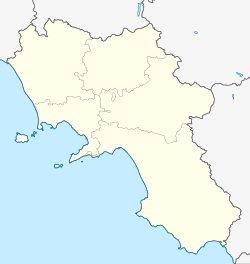Cervinara
You can help expand this article with text translated from the corresponding article in Italian. (January 2022) Click [show] for important translation instructions.
|
Cervinara | |
|---|---|
| Comune di Cervinara | |
 | |
| Coordinates: 41°1′17″N 14°36′55″E / 41.02139°N 14.61528°E | |
| Country | Italy |
| Region | Campania |
| Province | Avellino (AV) |
| Frazioni | Castello, Curielli, Ferrari, Ioffredo, Pantanari, Pirozza, Salomoni, San Marciano, San Potito, Scalamoni, Trescine, Valle |
| Government | |
| • Mayor | Caterina Lengua |
| Area | |
| • Total | 29.34 km2 (11.33 sq mi) |
| Elevation | 284 m (932 ft) |
| Population (30 November 2017)[2] | |
| • Total | 9,493 |
| • Density | 320/km2 (840/sq mi) |
| Demonym | Cervinaresi |
| Time zone | UTC+1 (CET) |
| • Summer (DST) | UTC+2 (CEST) |
| Postal code | 83012 |
| Dialing code | 0824 |
| Patron saint | St. Januarius |
| Saint day | 19 September |
| Website | Official website |
Cervinara is a town and comune in the province of Avellino, Campania, Italy.
History
[edit]According to the legend, the name "Cervinara" comes from an altar dedicated by the Romans to Ceres, goddess of the harvest. The name appears for the first time in 837 AD document, describing the donation of "castrum quod dicitur in Cerbinaria Caudetanis" to Sicard, Prince of Benevento, by the monks of San Vincenzo al Volturno. The village probably formed between the 9th and 10th centuries AD, when populations concentrated from the countryside around the fortified castle.
Cervinara was held by several feudal families, including the Filangieri, the Carafa, the Caracciolo and the Sant'Eramo. Until the early 19th century, it saw a distinctive agricultural development, mainly due to the particularly fertile soil.
During the Italian unification, the Cervinaresi contributed to the liberal movements of 1820 and 1848, when the conspirators decided to start from Cervinara to march on Naples and establish a Republic. However, the revolutionary ferment never managed to involve the majority of the population, and on 29/30 November 1860, Cervinara sided with the Bourbons against the Italian troops which had occupied the Kingdom of Two Sicilies.
In the 19th century, during the Brigandage in the Two Sicilies, the bands of Cipriano and Giona La Gala chose as a refuge the mountains above the village to fight against the Italian troops.

Main sights
[edit]This section is written like a travel guide. (January 2022) |

The Cervinarese artistic heritage include the Lombard medieval tower, now partially demolished, the Abbey of San Gennaro, built around 1100 and now dedicated to the Shrine of Our Lady of Sorrows, and the Palace Marchesale, dating from the late 16th century.
In 2017, the city installed a 20-meter-tall public art sculpture, "La chiave di Cervinara", by the artist Milot Alfred Mirashi.[3]
References
[edit]- ^ "Superficie di Comuni Province e Regioni italiane al 9 ottobre 2011". Italian National Institute of Statistics. Retrieved 16 March 2019.
- ^ All demographics and other statistics from the Italian statistical institute (Istat); Dati - Popolazione residente all'1/5/2009 Archived 2010-01-20 at the Wayback Machine
- ^ "Arrivò in Italia da profugo albanese. L'artista Milot dona un'opera al paese che lo accolse". Repubblica.it (in Italian). 2017-12-05. Retrieved 2019-01-28.





